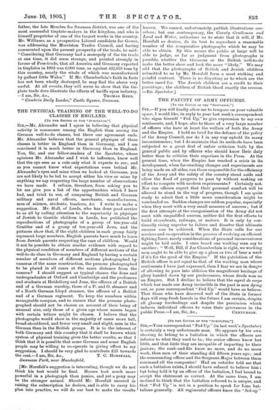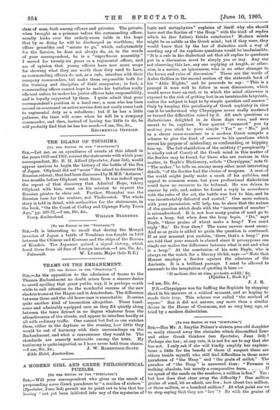SIR,--Your correspondent " Fed Up" (in last week's Spectator) is
certainly a very unfortunate man. He appears by his own showing to belong to a battalion in which the officers are inferior to what they used to be; the senior officers know but little, and that little they are incapable of imparting to their juniors; the rank-and-file know no more, and do no more work, than men of their standing did fifteen years ago ; and the commanding officer and the Sergeant-Major between them command all the companies Had an outsider told me that such a battalion exists, I should have refused to believe him ; bet being told it by an officer of the battalion, I feel bound to aecept the statement as correct. At the same time, I am inclined to think that the battalion referred to is unique, and that "Fed Up" is not in a position to speak for Line bat- talions generally. All regimental officers know the " fednii"
ekes of man, both among officers and privates. The private, when brought as a prisoner before the commanding officer, usually kicks over the orderly-room table in the hope that by so doing be will be discharged as worthless; the officer grumbles and "means to go," which, unfortunately for the Service, he does not always do, as, in the words of your correspondent, he is a "superfluous nonentity." I served for twenty-six years as a regimental officer, and am of opinion that young officers have now more scope for showing what they are worth than they used to have, as commanding officers do not, as a rule, interfere with their company commanders, but make them responsible both for the training and discipline of their companies; in fact, a commanding officer cannot hope to make his battalion really efficient unless he makes his junior officers take responsibility, and is loyally suppwted by them. I quite admit that your correspondent's position is a hard one ; a man who has been second-in-command on active service does not easily come back to regimental duty as a subaltern ; but if he has a little patience, the time will come when he will be a company commander, and then, instead of having too little to do, he will probably find that he has too much.—I am, Sir, &c., REGIMENTAL OFFICER.







































 Previous page
Previous page